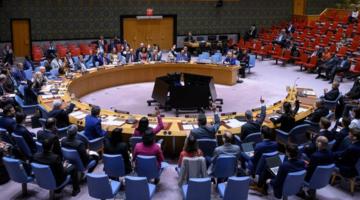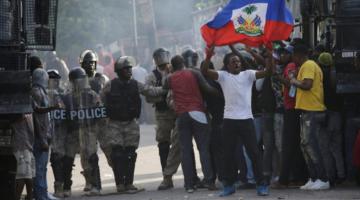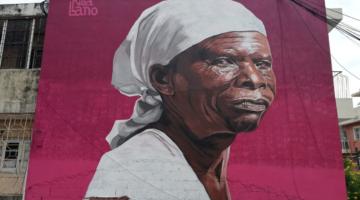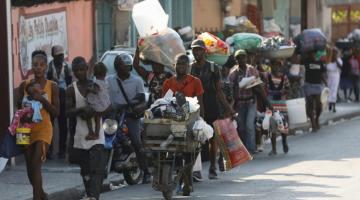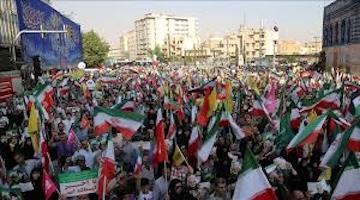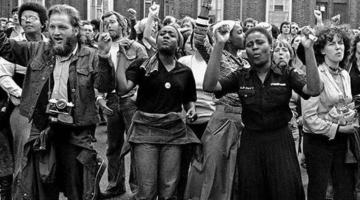Garment worker protesting in Port au Prince, February 17, 2022 Reuters: Ralph Tedy Erol
The garment workers' strike in Haiti can't be separated from that nation's history. Continued US interference on behalf of oligarchic rule keeps workers in poverty.
On February 16, 2021, thousands marched from the SONAPI park down the Toussaint Louverture Boulevard to the music of a sound truck chanting “1500 goud salè minimòm!” “Ariel, lè m grangou, m pa jwe.”[1] They carried tree branches and signs that read “Sispann fè kadejak sou fanm nan izin yo,” “Yon zegwi pa dwe gen plis enpòtans pase lavi yon ouvriye,” and “Ouvriye yo mande pou respekte Atik 137 Kòd Travay la”, “Gouvènman PHTK 3zyèm vèsyon se tchoul enperyalis ak patwon”, “Lapolis ak gang se bra ame leta boujwa,”[2][2] reflecting the plurality of their demands. At Kafou Rezistans,[3] police launched tear gas and bullets to disperse the crowd. Dozens were injured. Protestors regrouped and advanced up the main throughway to reach the official residence of de facto Prime Minister Ariel Henry.
This was the second week a consortium of unions[4] led garment industry workers to strike for two consecutive days in Port-au-Prince, less than one month after organizing demonstrations in the northeast of the country at the Caracol Industrial Park, to demand approximately $15 per day to produce apparel for brands and stores such as Hanes, New Balance, Champion, Gildan Activewear, Gap, and Walmart. This struggle for higher wages dates back to the establishment of the first industrial parks (garment manufacturing parks) under the dictatorship of François Duvalier during the Cold War. But it has to be situated within a larger context of struggle for living wages by (agricultural) workers since the first U.S. occupation (1915-1934) that led to the institution of the minimum wage in Haiti after the removal of the troops.
This “Fight for 15” is also a rejection of the extractivist export-oriented model of development that dispossesses Haitians of their ancestral agricultural lands to transform them into surplus labor for comprador capitalists.
In 1969, “President for Life” François Duvalier declared that “Haiti would become the Taiwan of the Caribbean” and signed a law authorizing the creation of industrial parks in the country, which his successor and son, Jean-Claude, strengthened with a decree in 1974. A subsequent decree in 1979 founded the Société Nationale des Parcs Industriels- National Society of Industrial Parks (SONAPI) a few kilometers from the Port-au-Prince airport. In preparation for this neoliberal transition, both Duvaliers facilitated land grabs in the countryside and built housing projects in the Port-au-Prince metropolitan area to accommodate rural migrants. They used brute military and paramilitary force to thwart all so-called communist rebellions and maintained minimum wages low to produce for GTE, MacGregor Sporting Goods, and General Motors.
While the Duvaliers sought total control over bodies, lives, livelihoods, and labor within the country’s borders, Haitian people living on the territory and in the diaspora fought for collective participation and self-determination. These efforts culminated into what militants call “The Revolution of 1986” when the U.S. helped their puppets, Jean-Claude and his cronies, leave Haiti safely. Jean-Bertrand Aristide won the first free elections in 1990 by a landslide. He was deposed within months by military and police heads, formerly trained at the U.S’ School of the Americas.
While he held an anti-imperialist position, Aristide ensured his return three years later with a U.S.-led United Nations mission and the appointment of several former Duvalierists to his cabinet, including Chicago School economist Leslie Delatour, who almost single-handedly wrote what Aristide and Haitians would eventually call the “Death Plan.” This plan privatized state institutions, liberalized the market that crashed the national production of rice, and gave a permanent seat within the Haitian state apparatus to international financial institutions like the World Bank and the International Monetary Fund (IMF).. In 1994, however, the minimum wage was raised for the first time in 10 years from 15 gourdes (or $3) to 36 gourdes (or $2.40) - a reduction, given the devaluation of the Haitian gourde.
The democratic turn in the 1990s, however, did not guarantee a people-centered model of development. Instead, those who control the global capitalist system, and their local neocolonial comprador class, treat Haiti as a continual site of extraction and a source of cheap labor. In 2002, the Haitian Parliament passed a Free Trade Zone (FTZ) Law that gave a 15- year tax exemption to manufacturing companies, and 10-year tax exemption to investors. The following year, the Inter-American Development Bank (IDB), the World Bank Group, and the Soros Economic Development Fund invested in the Dominican Republic’s private apparel manufacturer Grupo M for the construction of the first FTZ Compagnie de Développement Industriel S.A. (Company of Industrial Development (CODEVI)) in Ouanaminthe, a city at the border of Haiti and the Dominican Republic. During that same period, the minimum wage was raised to 70 gourdes (or $2.02), but this raise also did not make up for the gourde’s devaluation.
By January 2004, U.S. industrialist and member of the local oligarchy André Apaid, one of the main manufacturers at SONAPI, led the “Groupe des 184,” a coalition of so-called civil society organizations and individuals, to conspire with former military and police officers in exile in the Dominican Republic to overthrow Aristide for the second time. Along with the US, France, and Canada, which helped sponsor the coup, the Groupe des 184 also lobbied for a United Nations (UN) intervention and the establishment of an international council, the Core Group, to oversee the state. Meanwhile, the Association des Industries d’Haiti (Association of Industries in Haiti (ADIH)), led by a transnational capitalist class of people with multiple citizenships, lobbied and eventually secured the Haitian Hemispheric Opportunity through Partnership Encouragement (HOPE I) and HOPE II - respectively in 2006 and 2008 - to afford special tariff relief for apparel goods assembled from U.S. fabric coming from Haiti (and the Dominican Republic).
In 2007, Haitian garment industry workers renewed their fight for a living wage estimated already then at over 1,000 gourdes or $29 per day. The Haitian Parliament responded favorably in 2009, only to be vetoed by former President René Préval who, acquiescing to the order of the U.S. State Department, limited the minimum wage to 125 gourdes (or $3).
The 2010 earthquake presented an opportunity for the so-called international community to ensure what I call the new “Scramble for Haiti.” This scramble began with the manipulation by the Core Group and the Organization of American States (OAS) of Haiti’s elections to install the Parti Haitien Tèt Kale (PHTK). PHTK clearly articulated the same export-oriented model of development of the Duvaliers: mining, tourism, agribusiness and industrial parks. The first PHTK president, Michel Martelly, stated that Haiti was “open for business,” and funneled reconstruction funds to support the creation of the second FTZ Caracol Industrial Park in 2012. In 2015, the minimum wage was raised to 240 gourdes (or $4).
In 2016, thousands took to the streets to reject the imposition of a second PHTK government through the figure of political unknown Jovenel Moise. His predecessor, Martelly, had been ruling by decree while he, his family (many of them with high-ranking government positions), and his cronies squandered more than ⅔ of the PetroCaribe funds, or more than $2 billion dollars of public monies earmarked for social projects such as housing, infrastructure, and agriculture.
Protests persisted in 2017 against the national budget and continued in 2018 against IMF-imposed gas price hikes.
Over the following three years, demonstrations intensified all over the country against state corruption and, eventually, the illegality of Moise’s government. In turn, the police murdered and imprisoned militants. At the same time, armed gangs (or paramilitaries) terrorized the people in the poor neighborhoods, through kidnapping, rape, and massacres of hundreds of people. During the time, the minimum wage was raised every year to adjust for a parachuting devaluation of the gourde. But the minimum wage never exceeded $4.60.
Protests halted after Moise refused to step down in February 2021. His assassination in July pushed some organized dissenters to explore less confrontational tactics. Meanwhile, Moise’s antemortem Prime Minister nominee Ariel Henry was anointed by the Core Group to maintain the PHTK course.
The “fight for 15” has started a new cycle of protests in Haiti. After the February 16 protests, there were protests on February 23rd (where police killed journalist Lazard Maximilien and wounded two other people) and on February 24th. Though Henry’s government has offered a new minimum wage of 770 gourdes (or $7.40), union leaders refuse to concede and are holding steadfast to their demand for 1500 gourdes. They continue to strike.
[1] Haitian Kreyòl for: 1500 gourdes minimum wage! Ariel, when I am starving, I don’t play!
[2] Haitian Kreyòl for: “Stop raping women in the factories;” “A needle should not be more important than the life of a worker;” “Workers demand the respect of Article 137 of the Labor Code;” “PHTK version 3 is the minion of the imperialists and the capitalists (bosses);” “The police and gangs are the armed wing of the bourgeois state.”
[3] Kafou Resistance is at the intersection of Toussaint Louverture Boulevard and Route de Delmas in Port-au-Prince, Haiti. It has been the meeting point for protests to begin over the last decade. It is a strategic point in the city where different neighborhoods converge. Importantly, all up and down Toussaint Louverture Boulevard are the different factories, car, and generator dealerships, construction companies, and banks. Kafou Rezistans marks the end of that line up.
[4] Sendika Ouvriye Tekstil ak Abiman-Batay Ouvriye (SOTA-BO), Centrale Syndicale des Ouvriers Haitiens (CNOHA), Confédération des Travailleurs Haitiens (CTH), Respect des Ouvriers Haitiens de la Manufacture (ROHAM), Syndicat pour la Rénovation des Ouvriers Haitiens (SRODH), Association des Agents de Sécurité Professionnels (AASP), Groupement des Travailleurs (euses) pour la Réexportation d’Assemblage (GOSTTRA) and ALBA-Chapit Haiti
Mamyrah Prosper is the International Coordinator of the Pan-African Solidarity Network with Community Movement Builders. She is also an Assistant Professor of Global and International Studies at the University of California, Irvine.


